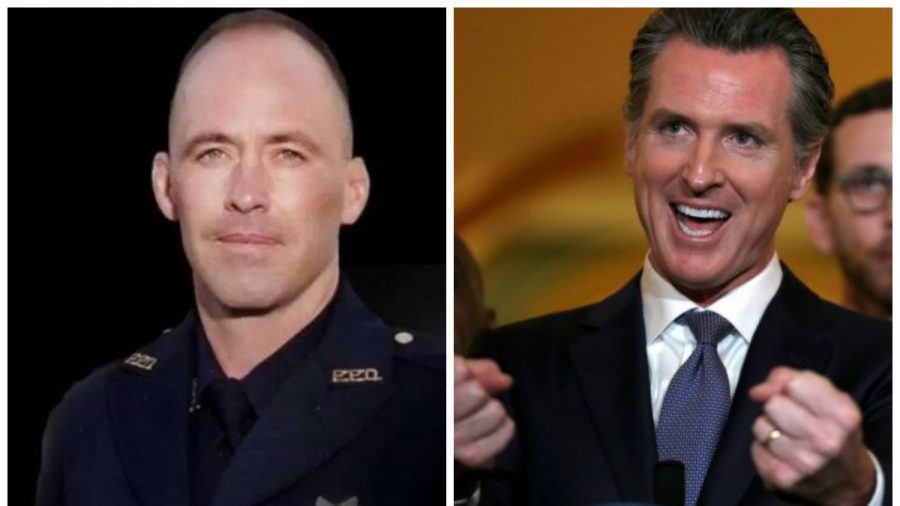The mother of a police officer whose murderer was slated to be executed is among those slamming California Gov. Gavin Newsom after he signed an executive order putting an indefinite halt to all executions in the state.
Phyllis Loya lost her son Larry Lasater when the police officer was shot and killed in 2005.
“My son was on a foot pursuit, he was ambushed, shot twice, and was killed in the line of duty, protecting his community,” Loya told Fox News.
The man convicted of killing him, Alexander Hamilton, has been waiting on death row since 2007. Hamilton told the courtroom before being sentenced to die, “I got the death penalty. I ain’t got no problem with that.”
“Shame on you”. That’s the message from the mother of murdered @PittsburgPD Officer Larry Lasater to Governor @GavinNewsom who has declared a moratorium on executions. #Deathpenalty #Newsom pic.twitter.com/FnkFVtsZTs
— Jodi Hernandez (@JodiHernandezTV) March 14, 2019
Newsom’s executive order came after voters in California rejected a proposal in 2016 that would have repealed the death penalty. Additionally, voters approved a proposal to speed up executions, since hundreds of convicted criminals were sitting for years slated for execution.
The state has a death penalty law that can only be prohibited by voters, but Newsom said on March 13 that he will grant reprieves to anyone sentenced to death while he’s in office, and the executive order will suspend executions in the state until further notice.
“I live in a very blue state, but the will of the people regarding the death penalty is they wanted the death penalty, they wanted to stop the delay. And instead what he’s done is impose his own personal will over the voters. He betrayed us. He stole justice from us like a thief in the night,” Loya said.
The comments came as a number of other family members of victims said Newsom’s order was the wrong move.
‘To see him die was my closure’: A Valley woman is devastated over Gov. Newsom’s order to stop executions. Her 3-year-old great-granddaughter was murdered, raped and tortured by a man now on death row. https://t.co/JkR3Veicnx
— ABC30 Fresno (@ABC30) March 14, 2019
Ruth Williams, the great-grandmother of Sophia Acosta, a 3-year-old girl who was raped, tortured, and murdered by Christopher Cheary, said that Cheary doesn’t have the right to live after what he did to the little girl.
“That was the closure we had. To see him die was my closure and I would’ve walked to San Quentin,” she said, referring to the prison where the executions took place before the executive order. “I don’t care—I would’ve walked there to watch it.”
She agreed with Loya in terms of Newsom taking the law into his own hands and not taking into account the will of the voters.
“How does he have the right to do this? We voted it. The people—we,” Williams said. “And then one man comes in and takes over, without asking our opinion?”

President Donald Trump also slammed the order, noting that Newsom was “defying voters.”
Because of a series of legal challenges to its method of lethal injection, California hasn’t executed a prisoner since 2006, but the state was trying to find a new execution protocol; the executive order also halted that effort.
According to the state’s Department of Corrections and Rehabilitation death row list (pdf), 737 inmates were slated to be executed prior to the executive order.
Marc Klaas, whose daughter, Polly, was kidnapped, raped, and murdered by Richard Allen Davis in 1993, also spoke out about Newsom’s decision.

“My daughter was a vibrant, 12-year-old child that was hosting a slumber party with two of her girlfriends in the home she shared with her mother in Petaluma,” Klaas told Fox 40.
“He had kidnapped, raped, and murdered her and then discarded her remains off the side of a freeway within about a two-hour time frame and felt absolutely no remorse for that at all.”
Davis being executed would be proper justice, the father said.
He added about the governor, “The reality is, is that he doesn’t care about my situation. He’s more concerned with my daughter’s killer than justice for my daughter.”

